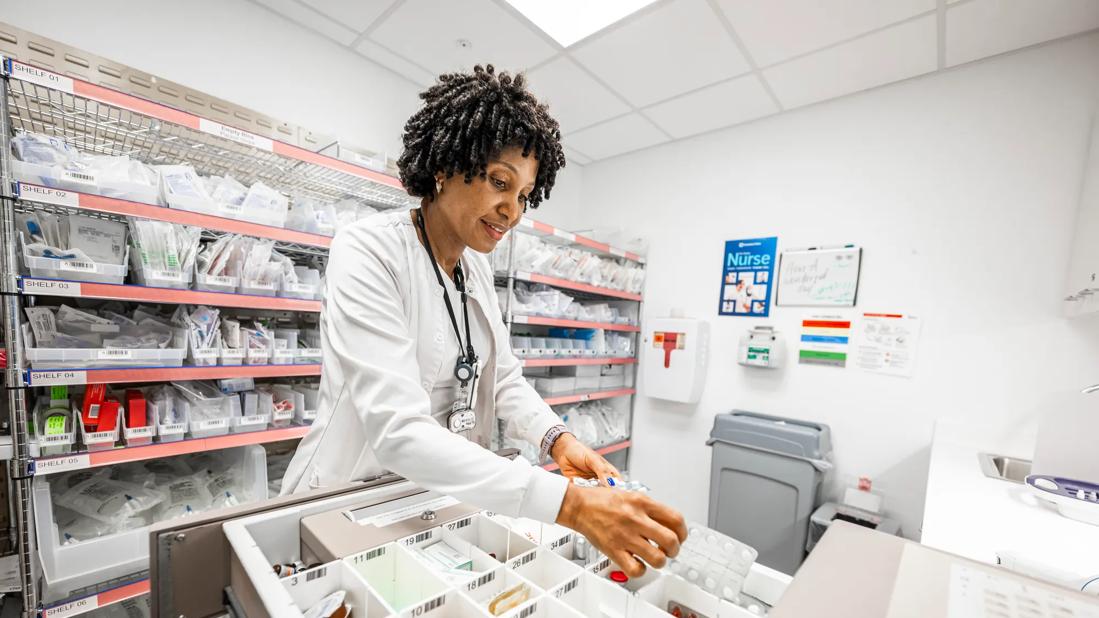First private hospital in the U.K. to receive HIMSS EMRAM Stage 6 accreditation

Image content: This image is available to view online.
View image online (https://assets.clevelandclinic.org/transform/b4f3e4aa-c343-408c-91b9-8786df7dae2c/NUR_4283376_10-20-23_037_MLC-jpg)
23-CCC-4284670-CQD-Hero-650×450
Oral medications are normally dispensed in multidose strips in U.K. hospitals, but not at Cleveland Clinic London. There, medications are provided to patients in single-dose units, each individually barcoded.
Advertisement
Cleveland Clinic is a non-profit academic medical center. Advertising on our site helps support our mission. We do not endorse non-Cleveland Clinic products or services. Policy
“In addition to being the first in the U.K. to use a novel unit-dosing robot, Cleveland Clinic London is the first to use automated dispensing cabinets in each ward and perioperative area,” says Francine de Stoppelaar, PharmD, Director of Pharmacy at Cleveland Clinic London. “These cabinets are connected to an automated stock-control management system. We’re also the first in the U.K. to use a hospitalwide barcoded medicines administration system that is connected to our electronic health record. At the bedside, caregivers scan both the medication unit dose and patient wristband, ensuring each patient gets the accurately prescribed medication, creating a fully closed-loop medicines administration system.”
Not only is this innovative medication-dispensing and -tracking system improving safety for patients and caregivers, it also is drawing attention from industry leaders. Due to pioneering technology like this, Cleveland Clinic London recently earned Electronic Medical Record Adoption Model (EMRAM) Stage 6 accreditation from the Healthcare Information and Management Systems Society (HIMSS).
This level of technological integration is rare for U.K. hospitals. Only eight out of more than 1,100 U.K. hospitals (0.73%) have achieved EMRAM Stage 6 or higher, and Cleveland Clinic London is the first private hospital to reach this milestone.
EMRAM is a framework that assesses the level of digital maturity and sophistication of healthcare organisations. To achieve EMRAM Stage 6, a hospital must demonstrate a significant level of digitalisation and integration of an electronic health record (EHR) into their operations. This digital integration contributes to high-quality care, efficiency, data utilisation and other benefits.
Advertisement
“Being awarded a Stage 6 accreditation from HIMSS is a major achievement for the team,” said Raihaan Mughal, Associate Chief Information Officer, Cleveland Clinic London. “We have built one of the most technologically advanced hospitals in the U.K., and I’m delighted that our focus on innovation to improve patient care has been recognised.”
In addition to praising Cleveland Clinic London for having one of the most forward-thinking hospital pharmacies in the U.K., the HIMSS assessor noted the hospital’s:
“[Cleveland Clinic London’s] visionary leadership, cutting-edge technology, and unwavering commitment to excellence are shaping the future of healthcare,” said the HIMSS assessor, John Rayner, Digital Health Strategist, in a press release.
Achievement of EMRAM Stage 6 indicates several advantages for Cleveland Clinic London and the other accredited hospitals:
Advertisement
Advertisement
Digital “tripwires” detect and respond to malicious activity, boosting cybersecurity maturity
Thoughtful collaboration, data-driven decisions and effective change management lead to significant savings
Clinical input is integral to technology implementation and adoption strategy
Unit-based project decreases non-urgent alarms
Integrating technology is more than product delivery
Cleveland Clinic partners with Palantir to create logistical command center
Cleveland Clinic’s roadmap to recovering critical digital assets stems from strategic planning and preparedness
The Friends of Cybersecurity program bridges innovative technology solutions with mitigating security risks